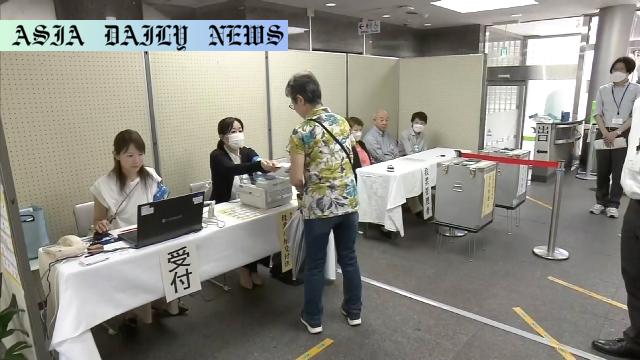Early Voting: Early voting began across Japan on Friday for the Upper House election on July 20.

Early Voting Begins for Japan’s 2023 Upper House Election
Early voting for Japan’s Upper House election commenced nationwide on July 7, 2023, allowing citizens who might face challenges on the official election day, July 20, to cast their votes in advance. This convenient system, in place since 2003, aims to improve overall voter participation while addressing the modern-day constraints of travel and work schedules. Over 522 candidates have registered for the election, each competing for seats either in specific electoral districts or under the proportional representation system.
The upcoming election not only shapes the parliamentary strength of Japan’s Upper House but also steers the nation’s future policies. Significant topics include strategies to curb rising prices and the sustainability of the social security system. With inflation and demographic challenges looming large, voter sentiment will likely pivot around these pressing economic and societal issues.
Growing Popularity of Early Voting Since 2003
Since its introduction, early voting has gained widespread traction across Japan. In the last Upper House election in 2022, 35.9% of eligible voters took advantage of this system, amounting to a significant 19.6 million participants. The rise in early voter turnout showcases a shift toward accommodating the demanding schedules of citizens, ensuring that no one misses their chance to participate in the democratic process.
Municipalities have taken significant steps to streamline the process. From extending the operating hours of polling stations beyond the typical 8:30 a.m. to 8:00 p.m. to setting up ballots in accessible locations like university campuses, shopping malls, and railway stations, authorities are leaving no stone unturned in their quest to encourage nationwide engagement. Some venues are open even earlier or close later to facilitate voters juggling workday obligations.
Election Issues: Rising Prices and Social Security
The election has brought key policy issues to the forefront. With inflation outpacing wage growth, the rising cost of living is a primary concern for many Japanese citizens. Political parties are striving to present actionable solutions that appeal to voters’ economic worries. Additionally, social security’s long-term stability is another hot topic. With Japan’s aging society, ensuring adequate pension, healthcare, and welfare systems is critical to future policymaking.
With these themes taking center stage, the government’s ability to address citizens’ apprehensions and propose strategic initiatives will significantly impact the outcome. Voter turnout remains a pivotal factor, and the popularity of early voting showcases a modernized framework catering to the scheduling needs of the 21st-century electorate.
Looking Ahead: The Future of Japan’s Democratic Engagement
As early voting continues through July 19, the commitment of municipal governments and voters alike reflects an evolving democratic landscape in Japan. By broadening accessibility to polls and confronting systemic challenges like rising prices and social security reforms, the nation moves steadily towards addressing contemporary societal issues. Early voting captures the essence of participation: equipping citizens with the tools they need to shape the country’s future effectively.
With nearly 20 million early voters in 2022, this year’s election could set a record for voter engagement, fostering confidence in Japan’s ability to adapt its electoral process to the needs of its populace. An informed and involved electorate will ultimately drive meaningful change in Japan’s democracy.
Commentary
The Significance of Early Voting in Japanese Democracy
Early voting has emerged as a cornerstone of modern democracy in Japan, reflecting an adaptive approach to meet the dynamic and complex challenges of the 21st century. As we delve into the nuances of this election mechanism, it’s striking how this system empowers individuals who may have otherwise been excluded from the process, due to the rigid scheduling demands of conventional voting procedures.
By setting up polling stations in convenient locations such as university campuses, shopping centers, and railway stations, and by extending operational hours, the government signals its commitment to inclusivity. This proactive approach not only boosts voter turnout but also ensures that individuals from all walks of life have a say in the nation’s future. It’s refreshing to witness a process that puts the needs of its people at the forefront, fostering an atmosphere of accessibility and accountability.
The Role of Economic and Social Issues in the 2023 Election
The Upper House election comes at a time when Japan grapples with rising inflation and the looming strain on its social security system. Tackling these issues calls for robust and actionable strategies from candidates and political leaders. The electoral dialogue offers a platform for inclusive discussions on pressing matters, setting the tone for policy directions in the years to come.
However, as Japan navigates these challenges, it becomes increasingly apparent that citizen participation is indispensable. The rise in early voters underscores society’s acknowledgment of the gravity of these issues and its willingness to engage with them. When people vote, they cast more than just a ballot—they express their hopes, concerns, and ambitions for the national future.
Looking Ahead
Japan’s advancements in voter accessibility, evidenced by the growing popularity of early voting, serve as a model for participatory democracy. However, this is not to suggest that challenges do not exist. Voter education, transparent communication, and policy innovation remain essential for ensuring that the electorate can make well-informed decisions. The future of democratic engagement in Japan appears promising; as more citizens take advantage of early voting, the ripple effects of this system can inspire broader reforms globally. Empowering individuals to shape national decisions is the heart of democracy, and Japan is taking laudable steps toward achieving this ideal.


